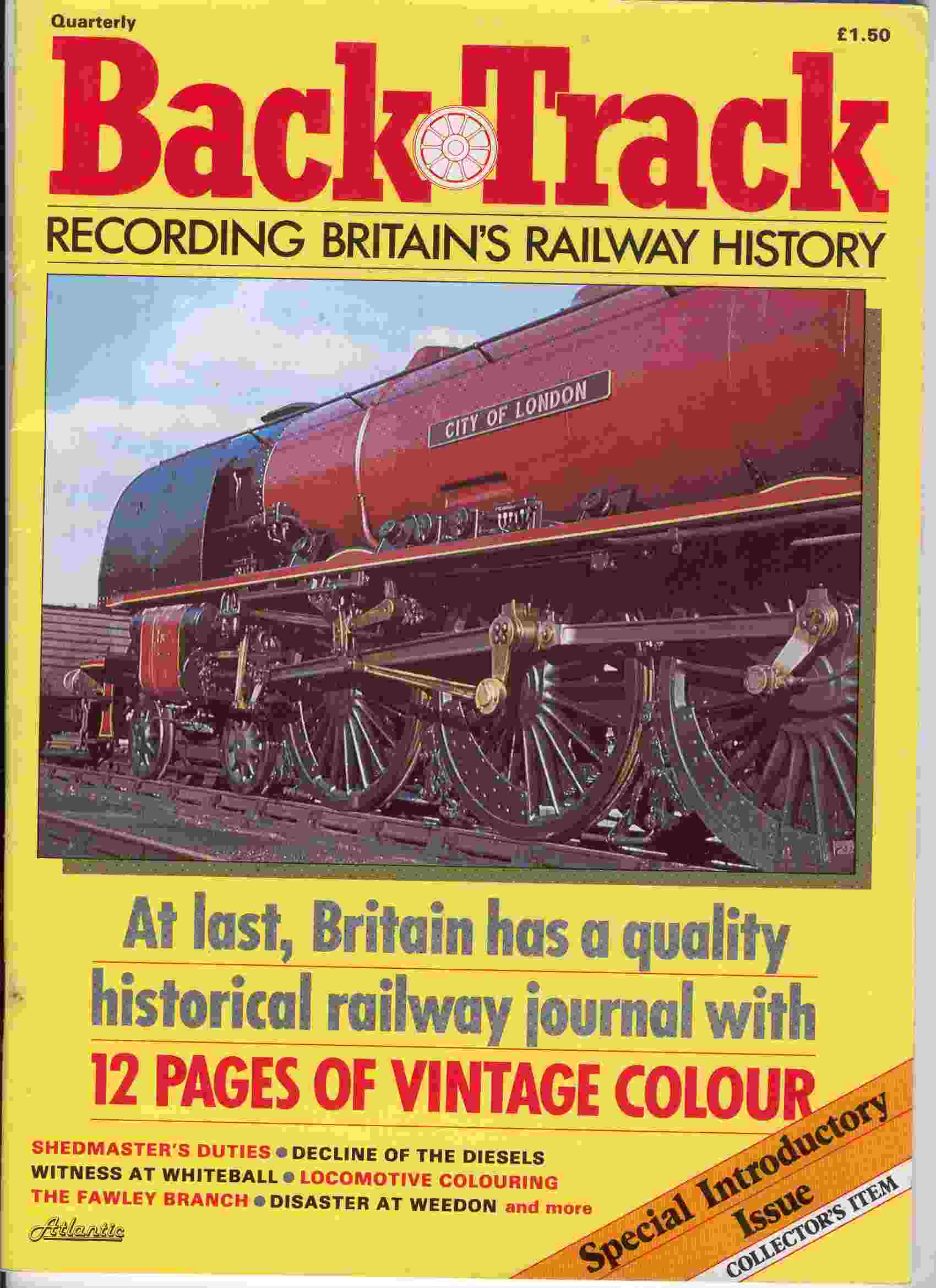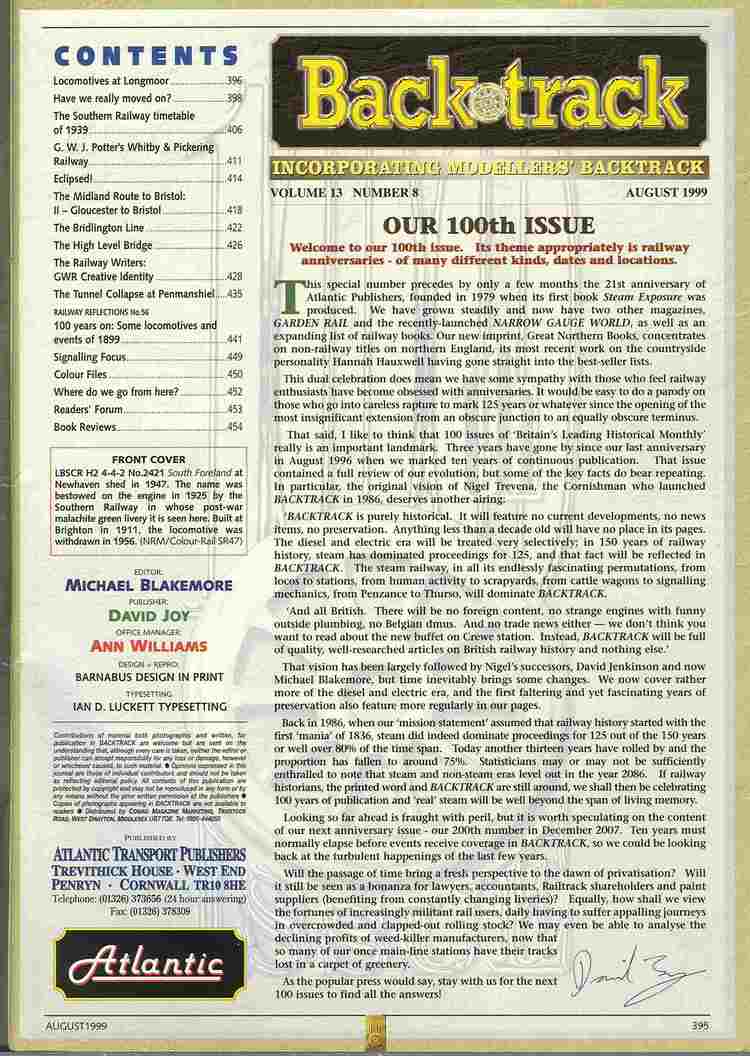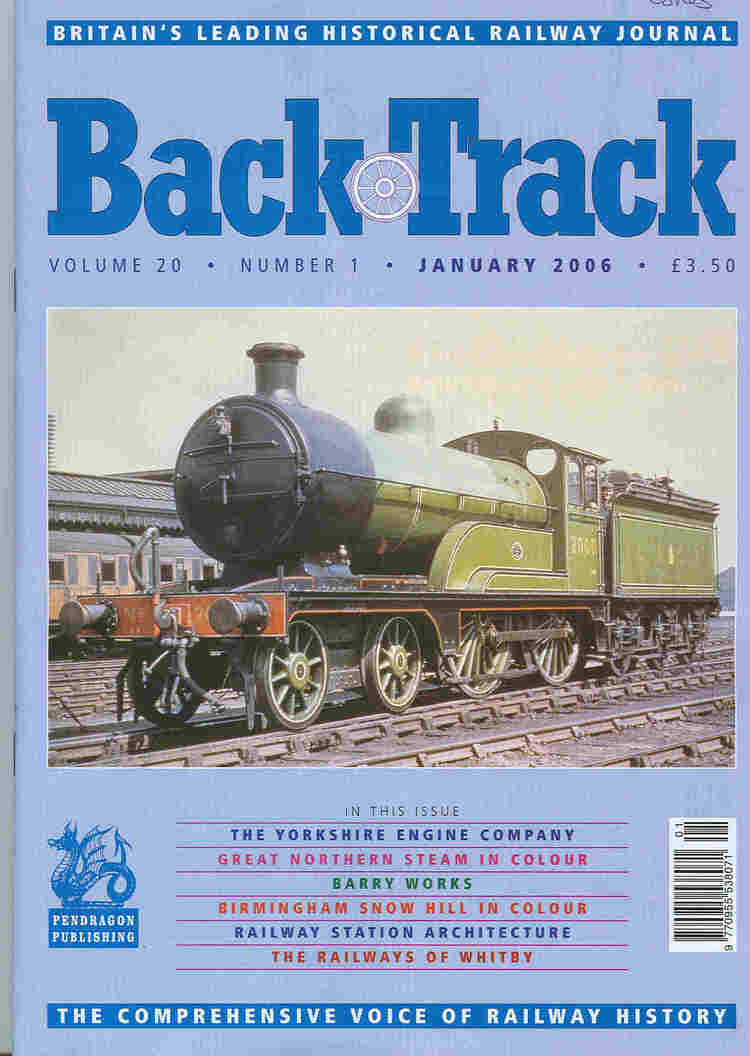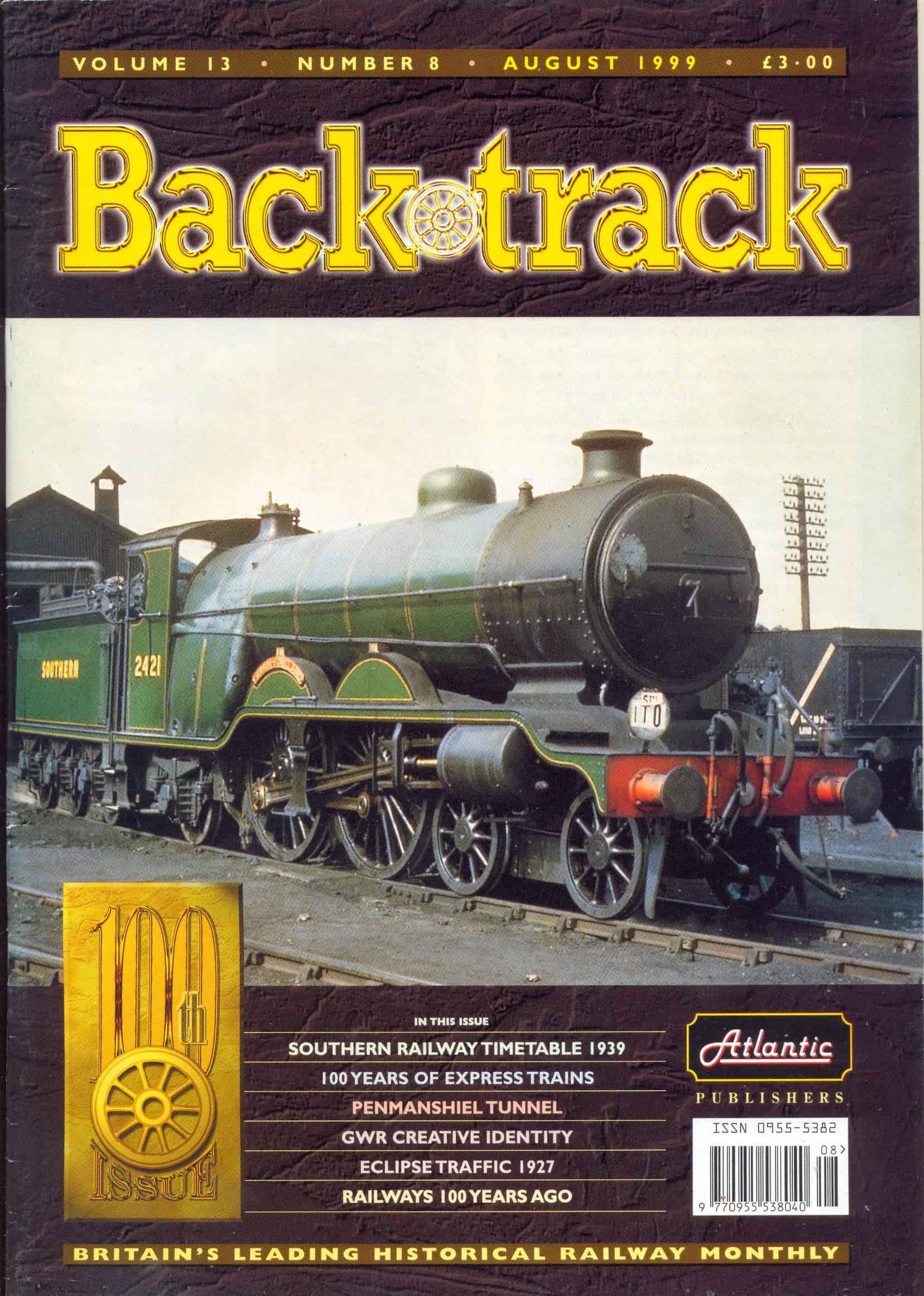 |
 |
 |
 |
| Introductory Issue | Number 100 | 2006 No. 1 |

Backtrack: precis of Introductory Volume
Now Published by Pendragon, Easingwold, YO61 3YS
 |
 |
 |
 |
| Introductory Issue | Number 100 | 2006 No. 1 |
Backtrack (or is it BackTrack?) is a high quality magazine for enthusiasts (its quality was only surpassed by the greatly lamented Railways South East). It consists solely of historical material and does not contain news. Its content predomininently relates to Britain (including Ireland), but Michael Rutherford (an interesting former regular contributor, who appears to be moderately authorative) lets his eye wander over a much wider territory which includes British influence overseas. Unfortunately, some enthusiasts take an extremely narrow view: in fact, the influence of developments on Continental Europe, North America, and in the former "Empire" (notably in India) had a seminal influence on development in Britain. Backtrack is an excellent source of colour illustrations, but see also David Jenkinson's magic carpet. Backtrack's publisher now operates a website. The journal came into existence hesitantly with a sample issue, was then published quarterly, from the Spring issue of 1987, bi-monthly from Volume 3 No. 3 (July/August 1989, and monthly from 1995 (Volume 9). It has spawned two completely separate supplements (one is a journal and the other is a "book"). Modellers' Backtrack ran from 1991 to 1995 and was a bi-monthly. The rear cover colour illustrations were especially interesting as they tended to be based on vintage colour photographs. The series by Michael Rutherford under the names Provocations/Railway Reflections will be the subject of a special listing..
This section has been able to grow more rapidly thanks to the kind assistance of Bob Farmer who produced a spreadsheet giving details of all the illustrations. Programs have been written which coverted this into a format compatible with the remaining material. All issues have been indexed (including the most recent), but the depth of coverage varies somewhat. The first 100 issues were "celebrated" by David Joy with an exercise in excessive over-type illustrated above.
There have been four special issues (two incorporated within the magazine, and of questionable quality, one published as a Supplement on the LMS (superior to the LMS Journal), and one publshed as a separate (on the LNER: excellent, but too detached). There was also Bedside Backtrack: excellent, but not really bedside reading as it contains an in-depth survey on early Pullman cars in Britain, and one of the best pieces written by Philip Atkins. The choice of illustrations could have been better: there are too many by the late Eric Bruton. It was presumably a commercial failure as it was not repeated.
The address of the publisher was Atlantic Publishers, Trevitick House, West End, Penryn, Cornwall, TR10 8HE: back issues were available for many issues, but not this volume. It is now publshed by Pendragon Publshing and distributed by Warner of Bourne.
Volumes:
Special Introductory Issue
This issue, which has become a collector's item, included many features which did not survive: some were good, some (such as the chunks of Railway Observer) were questionable. This issue used Roman numerals (not reproduced below). On the other hand, the wonderful assistance of Dick Riley, and his magic colour photographs (why did the sun shine on him?) is there right at the start, and still gives a great deal of character to the magazine. This issue is cited as issue "0" [zero].
LMS Pacific No 46245 City of London at Camden shed on 16 Feb 1958. R.C. Riley. front cover
Shedmaster: P.N.Townsend [The Backtrack Interview].
4-10
Duties; "day in the life of"; maintenance; coaling; watering; repairs;
rostering; "Top Shed was by and large a happy depot"; illus.: including portraits
of interviewee, view of King's Cross shed in 1961 col. R.C. Riley); b&w:
checking an A4 valve crosshead for play; running foreman's office; track
diagram - King's Cross 'Top shed' 1960's; coaling tower; wheel lathe; valve
examination; A1 class pacific 60141 Abbotsford at King's Cross shed;
69499 (N2) at King's Cross shed; dismantling eccentric strap on N2, axle
problem on BR class 5; checking screw coupling on N2; firedropper at
work
Decline of the Diesels. Ashley Butlin. 11-13.
The rapid withrawal of some diesel locomotives, notably the highly
unsuccessful class 21 and 28 and diesel hydraulics. Some found a further
existence as industrial locomotives, notably the very young class 14. illus.:
49 tons of scrap - what is left of D3494; St Philip's Marsh dump, Bristol;
The shell of class 40, 40173 in Perth goods yard;
Witness at Whiteball. R.C. Riley. 14-18.
Notes on traffic on the approach to Whiteball summit in the 1950s,
including the use of banking engines. Illus.(b&w): No 6867 Peterston
Grange passing Burlescombe box in 1954; 2-6-2T No. 4136 waits while No
6848 Toddington Grange passes; No 6946 Heatherden Hall entering
Burlescombe station; Mogul No 9301 making a determined effort at the bank;
6009 King Charles II with only 10 corridors; No 1003 County of
Wilts passing Whiteball sidings box displaying its new roof; 'Castle'
7001 Sir James Milne with a train of LMS stock; 'Britannia' Pacific
70015 Apollo with 14 on;
An analysis of locomotive colouring in the last years of
steam. 19-22.
Notes entitled Points on paint by P.N. Townsend (Kings Cross Top Shed
had a painter available); The artist's eye by David Shepherd (the way the
artist approached painting locomotives, especially when they were on shed;
and All shades of black by Nigel Trevena extended captions from blackberry
black when new to grey as displayed by an Austerity. Illus.(all col. except
first): A3 60055 Woolwinder getting its number plate repainted by
Harry Frost; inside Leeds Holbeck shed (Joe Richardson ); Shepherd painting
of BR class 4 2-6-0 76069 at Guildford shed;
All shades of black. Nigel Travena (captions)
Colour photo feature: BR 9F 2-10-0 92153 at Toton shed (44088 also visible)
on 27 September 1959; ex GW 2-8-0 3824 at Swindon in ex works condition on
6 November 1960 (both R.C. Riley); W.D.2-8-0 90611 at Burnley in typical
grey condition in May 1964 (J. Richardson).
Bulleid's brilliance. 24-5.
Colour photo feature: 35018 British India Line and 35020 Bibby
Line at Southampton; Port Line 35027 at Folkestone Jn. and with
the Golden Arrow at Victoria (both in 1954): (latter by S.C. Townroe
also shows lady and boy with cap and very smart leggings: were they about
to board with photographer?); 35018 British India Line near Winchfield;
into the night, a view of 35026 Lamport and Holt Line waiting for
the road (all rebuilt except 35027): photographers: S.C. Townroe; J. Davenport,
B.J. Swain, Paul Riley, L.F. Folkard.
Standard studies. 26-7.
Colour photo feature:.: A 9F on a Consett iron ore train near Leadgate;
BR Std class 4 No 75033 climbing Talerdigg Bank; Class 5 4-6-0 73097 passing
Coleham box Shrewsbury. Photographers: Derek Huntriss, Joe Richardson and
P.M. Alexander;
The Fawley branch. Stanley C. Jenkins. [Branch line
notebook]. 28-33.
LSWR obtained powers for branch in 1903, but these were not used:
in 1921 a separate Totton, Hythe & Fawley Light Railway was promoted
and these powers passed to the Southern Railway which opened the line on
20 July 1925. The development of the line is described including its then
current state. Includes plans of each of the branch line stations.
Subsequent correspondence illus.: An RCTS railtour
on the Fawley branch with two U.S.A. class 0-6-0's Nos.30064 and 30073 (Roy
Hobbs - col); B&w: Fawley in Southern days with 0-4-4 T No 191; The first
passenger train at Fawley in 1925; The first passenger train at Hythe; Class
3MT 2-6-2T at Fawley; ex LSW class M7 leaving Marchwood; Track Diagram -
Fawley branch; Adam's class A12 0-4-2 No 611 leaving the Fawley branch at
Totton; Totton station in 1940; Three views of Fawley in 1952; Track diagram
- Fawley - 1925; Track diagram - Hardley Halt - 1957; Track diagram - Hythe
- 1925; Track diagram - Marchwood - 1925;
Disaster at Weedon. Lewis Reade. 34-7.
Derailment of Princess Royal class 46207 Princess Arthur of
Cannaught on express train on 21 September 1951 which led to the deaths
of 14 passengers and one member of the dining car staff. The footplate crew
survived and protected their train in spite of being severely shaken. The
line was reopened in 30 hours. The later recovery of the locomotive,
using Kelbus apparatus, is also described. The accident enquiry, conducted
by Lt. Col. G.R.S. Wilson, concluded that the derailment was caused by an
excessively tight bogie axlebox. illus.: The grim sight at Weedon about two
hours after the accident on 21st Sept (aerial photograph Press Association);
Track diagram of accident recovery;
Great Central genesis views of building and opening the
line. 38-9.
Five photographs with extended captions by John Healy. illus.: Marylebone
takes shape (surface prepared with retaining walls, but no station buildings;
very lavish contractor's compound; A 4-4-0 No 859 on up express passing Brackley
Central; inevitable opening banquet held on station concourse; inaugural
run - a silver lever to start locomotive 861;
Steam locomotive boilers. John Hilton. 40-1
Definitions of regulator, superheater, snifting valves, blast pipes,
blowers, safety valves, injectors (no diagram!), fusible plugs, problems
in use and innovations, such as Kychap exhaust and Franco-Crosti boilers.
Illus.: Diagram of a superheated boiler; A BR class 78xxx having a boiler
washout; Locomotives at Hooksgate sidings for disposal;
Yesterday's Observer Jan 1948. 42-3.
Yesterday's Observer Jan 1963. 43
Extracts from RCTS Railway Observer
GWR diesel railcars. 44.
Based on extracts from RCTS Railway Observer including Car
No. 8 at Dudley.
Colour files. R.C. Riley.. 45.
Sheepridge No 23 (Hudswell Clarke 1022 of 1913); Wellow station
S & D in 1959 (R.C. Riley (phot.))
The last of steam on Shap. Paul Riley. back cover.
Atmospheric shot
Updated 2020-10-26